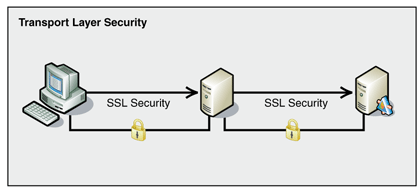Transport Layer Security
From Computing and Software Wiki
m |
m |
||
| Line 9: | Line 9: | ||
==How It Works== | ==How It Works== | ||
| - | [[Image:sslsecurity.gif|thumb|right|'''Transport Layer Security'''<br>Explanation.]] | + | [[Image:sslsecurity.gif|thumb|500px|right|'''Transport Layer Security'''<br>Explanation.]] |
Revision as of 06:03, 9 April 2008
Transport Layer Security (TLS) is a cryptographic protocol that ensures privacy for communication over the Internet. It is the successor of the Secure Sockets Layer (SSL) protocol, though there are only minor differences that separate the two.
Contents |
History
During the mid 1990s, it became obvious that security was necessary for Internet commerce. Many different mechanisms were proposed by different groups. Netscape, Inc. was the group that initially developed the SSL protocol. While this was never formally adopted by the Internet Engineering Task Force (IETF), SSL was the basis of the IETF-designed protocol TLS which was first defined in 1999. In fact, SSL and TLS are so similar that most implementations of SSL support TLS, and both protocols use the same port number.
How It Works
Security Measures
Applications
See Also
References
External Links
--Milesj2 01:00, 9 April 2008 (EDT)

